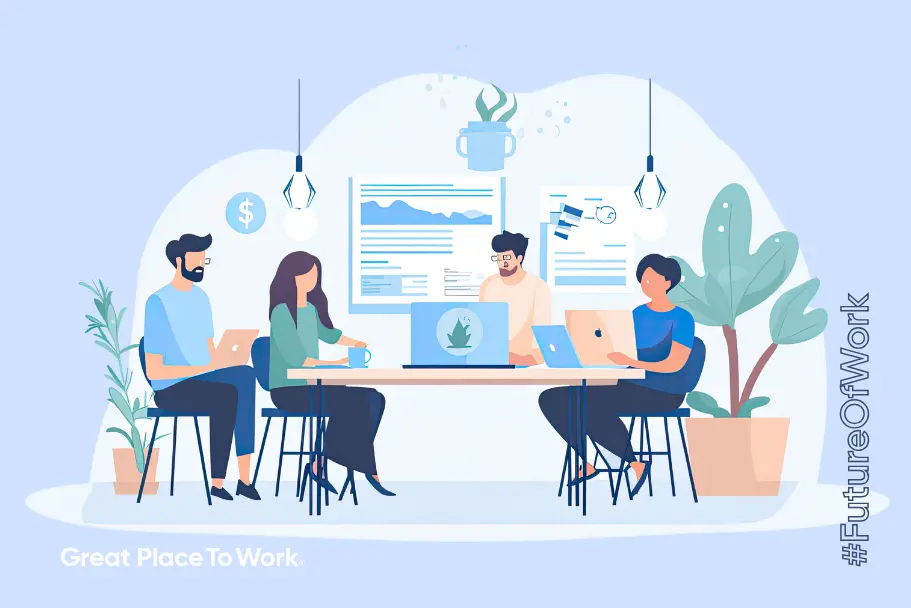
Change is the new normal. And for employees to manage change well, they need to know their employer will be there to support their career growth as they learn new skills and adapt to new expectations.
Ultimately people crave challenge and they want to advance their careers so it’s no surprise that great workplaces invest in career growth for their people and make professional development a priority. Their professional development practices help to encourage skills development as well as empowerment and trust.
This unique combination undoubtedly contributes to high workplace satisfaction results with 95% of employees, at this year’s Best Workplaces for Professional Development™, agreeing that taking everything into account, they would say theirs is a great place to work. Here is some insight into what these organizations are doing to support career growth while also building trust.
What Professional Development Initiatives Best Support Career Growth?
Training and Development
The most obvious answer is training and development. This is what we all think of when we hear the term Pro-D. Offering seminars, on-the-job training, lunch ‘n learns, and tuition reimbursement programs all factor high in successful professional development practices. These are the tried-and-true means to ensure people’s skills stay up to date and that industry standards continue to be met amidst the fast pace of change.
"93% of employees at the Best Workplaces for Professional Development agree they are offered training or development to further themselves professionally."
This is also how people further their broader professional skills and move either vertically or horizontally through the organization. Leadership programs help those whose career growth plans include vertical movement. Cross training and collaborative teams facilitate skill development to promote continuous learning and ward off stagnation, boredom, and apathy. People genuinely want to keep learning and growing, and strong professional development practices contribute to high levels of satisfaction, motivation and engagement.
Consider the following best practices:
- Transfer employee knowledge through peer-to-peer training and tap into the expert knowledge within your organization on a regular basis. Not only does this enhance the skills of the learner, it provides great career growth opportunities for the expert trainer as well.
- Create individual learning and career paths. Map out for each employee their ideal career growth journey and then customize a plan to help them reach their goals.
- Encourage continuous dialogue regarding career planning and career growth. Find out what motivates your people, discover what ‘getting ahead’ means to them, and what challenges they are facing that skill development could help with.
Responsibility and Empowerment
Professional development initiatives empower employees to improve their skills, build expertise and adapt their knowledge to new challenges and changes that face them. As skills and knowledge grow, so does responsibility and empowerment, both of which are vitally important to career growth and satisfaction. Through offering growth and development opportunities, organizations improve the overall employee experience while also encouraging employees to reach their full potential. This creates a win-win with highly skilled employees who are more likely to stay with an organization that fully supports their career growth.
"93% of employees at the Best Workplaces for Professional Development agree they are given a lot of responsibility."
Workplace learning also improves employee performance by giving them the means to grow with the company and contribute to a culture built around performance. Empowering employees with lots of responsibility and continual skill development helps them recognize how important their role is to the overall success of the company. And by investing in their skill development, you signal that the organization values them for both what they do and who they are.
Consider the following best practices:
- Delegate deliberately with professional development as the key outcome. Rather than just a means to getting something done, delegation provides a powerful tool to encourage responsibility and build empowerment.
- Offer a mentoring program. This encourages positive and productive workplace relationships and it helps people envision themselves in different roles, taking on different responsibilities and contributing meaningfully to the organization’s success.
- Use stretch assignments to build confidence and skills. When you get people out of their comfort zone they naturally grow to meet the new challenges. Provide lots of responsibility and autonomy as a way for employees to experiment with decision making and problem solving and be there to guide and encourage them when mistakes happen.
Trust
While trust may not be something typically associated with Pro-D, it is vitally important to establishing a strong career growth trajectory. People need to feel trusted to do their best work and achieve their full potential and this is ultimately what professional development is all about. If you want to help employees achieve their career goals, support them by getting out of the way and letting them do their best work. Provide clear outcomes and expectations and then show them you trust them. This lets employees know what they need to achieve, allowing them more ownership, and it also shows them the value of integrity and trust in the organization.
"94% of employees at the Best Workplaces for Professional Development agree management trusts them to do a good job without watching over their shoulders.
Trust is also a catalyst for career growth in that it allows people the freedom they need to experiment with new ideas and find innovative ways to solve problems. It allows them the autonomy they need to make decisions on their own and practice trusting themselves to make the right choice given a clear set of parameters and values to follow. Professional development hinges on letting people become their best self so it has to honor that there are many different ways to achieve a set goal or outcome. Trust is what allows people to figure out their own best path which leads to their own best future.
Consider the following best practices:
- Just say no to micromanaging. Give employees autonomy to do work the best way for them. Understand employees as individuals and support them with the tools and resources they need, and then give them the freedom to work independently.
- Celebrate mistakes. Rather than punishing them, recognize that mistakes create the best lessons in life and that EVERYONE makes mistakes from time to time, especially during the learning process.
- Provide lots of feedback and encouragement. Learning is about doing and trying and failing and then trying all over again. The more people know they are free to experiment the more they will feel free to learn and grow.
Professional development, as a set of practices, is as much about specific programs designed to build knowledge and skills, as it is about setting the stage for career growth. The key is recognizing that career growth means different things to different people. The best practices for professional development see it as a broad cultural approach to individual development that enables individual workers to achieve their career goals while also advancing the goals of the organization. The Best Workplaces for Professional Development understand this relationship and have created high overall workplace satisfaction as a result.
If you’re not already using the Great Place to Work survey, reach out to us to learn about how we can help you improve employee engagement and satisfaction and become eligible for one of our Best Workplaces lists.







